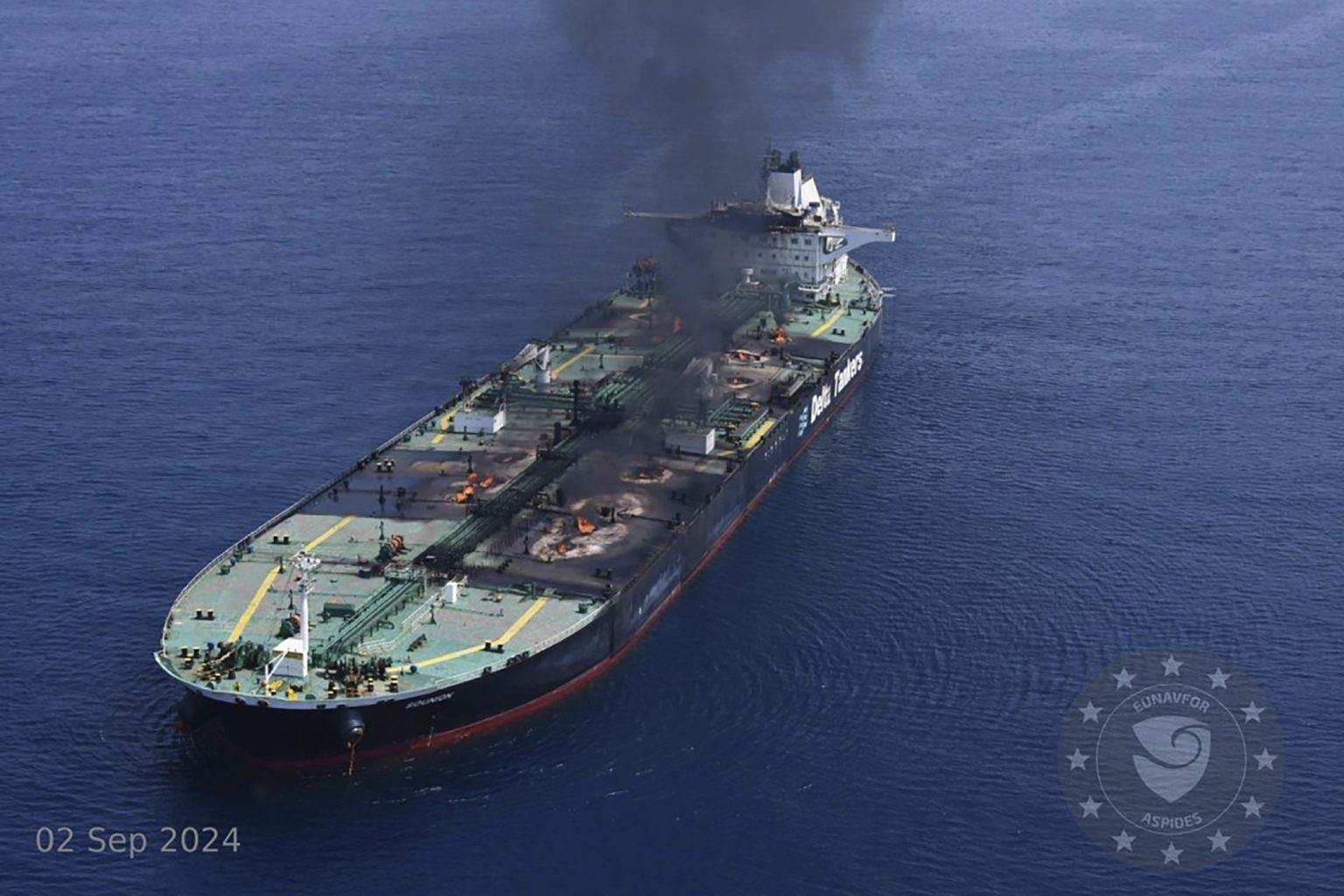Salvage efforts to tow the burning oil tanker Sounion in the Red Sea have been abandoned, putting the vessel at risk of spilling its one million barrels of oil. The EU’s Operation Aspides announced that conditions were not safe to proceed with the salvage operation, leaving the Greece-registered vessel stranded. The Sounion was attacked by Iran-backed Houthi rebels on August 21, and a continuing blaze has been confirmed by NASA fire satellites. The potential oil spill from the Sounion could result in one of the worst environmental disasters in recent history.
The crew of 25 Filipinos and Russians, along with four private security personnel, were rescued by a French destroyer and taken to Djibouti as part of Operation Aspides. The situation with the burning oil tanker in the Red Sea has become increasingly precarious, with the vessel remaining anchored since the attack. Representatives for the rebels have indicated they may allow salvage operations, but past actions suggest they could be using the threat of an environmental catastrophe to gain concessions. The Houthi rebels have disrupted maritime traffic in the region, targeting ships they believe are connected to Israel, the U.S., or the U.K., leading to over 80 attacks since the war in Gaza began in October.
Yemen’s Houthi rebels have continued to target merchant vessels in the Red Sea, sinking ships and causing damage to goods passing through the region. While they claim to target vessels linked to their enemies, many attacked ships have little or no ties to the ongoing conflict. The U.S. State Department has expressed concerns over the potential impact of an oil spill from the Sounion, warning it could be four times the size of the Exxon Valdez disaster in 1989. Despite the U.S. Navy having two aircraft carriers stationed in the Gulf of Oman, there are currently no American vessels operating in the Red Sea, leaving the EU’s Operation Aspides to manage the situation.
The potential consequences of the burning oil tanker Sounion in the Red Sea include a significant environmental disaster if the vessel were to spill its cargo of one million barrels of oil. The ongoing conflict between Yemen’s Houthi rebels and maritime traffic in the region has resulted in multiple attacks on merchant vessels since October. The rebels’ actions have led to disruptions in the flow of goods passing through the Red Sea, impacting international trade and commerce. The U.S. State Department has raised concerns over the scale of a possible oil spill from the Sounion, highlighting the need for effective salvage efforts to prevent further environmental damage.
The situation surrounding the burning oil tanker Sounion highlights the risks posed by ongoing conflicts in the region and the potential for environmental disasters as a result of attacks on ships. The involvement of various international entities and the challenges faced in salvaging the vessel underscore the complexities of managing such crises. The actions of the Houthi rebels and their targeting of merchant vessels have raised further concerns about the safety and security of maritime traffic in the Red Sea. Efforts to prevent an oil spill from the Sounion and mitigate the impact on the environment will require coordinated and effective responses from the international community.
The burning oil tanker Sounion in the Red Sea represents a critical situation that requires urgent attention and decisive action to prevent a major environmental disaster. The ongoing challenges faced in salvaging the vessel and the potential risks associated with an oil spill underscore the need for coordinated efforts to address the situation effectively. The impact of the conflict between Yemen’s Houthi rebels and maritime traffic in the region has already been significant, with multiple attacks on merchant vessels causing disruptions to international trade. As efforts continue to manage the situation and prevent further damage, the importance of addressing the root causes of such conflicts and ensuring the safety of maritime traffic in the Red Sea remains paramount.








